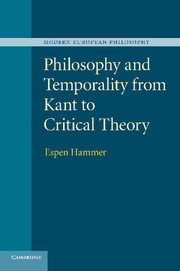Book contents
- Frontmatter
- Contents
- Acknowledgments
- Introduction
- 1 The historicity of time
- 2 Modern temporality
- 3 Two responses to the time of modernity
- 4 Hegel's temporalization of the absolute
- 5 Schopenhauer and transcendence
- 6 Time and myth in the early Nietzsche
- 7 Recurrence and authenticity: the later Nietzsche on time
- 8 Heidegger on boredom and modernity
- 9 A modernist critique of postmodern temporality
- Conclusion
- Bibliography
- Index
1 - The historicity of time
Published online by Cambridge University Press: 21 April 2011
- Frontmatter
- Contents
- Acknowledgments
- Introduction
- 1 The historicity of time
- 2 Modern temporality
- 3 Two responses to the time of modernity
- 4 Hegel's temporalization of the absolute
- 5 Schopenhauer and transcendence
- 6 Time and myth in the early Nietzsche
- 7 Recurrence and authenticity: the later Nietzsche on time
- 8 Heidegger on boredom and modernity
- 9 A modernist critique of postmodern temporality
- Conclusion
- Bibliography
- Index
Summary
The aim of this chapter is to establish a general theoretical framework for analyzing the various post-Kantian positions that emerge in response to the temporality of modern life. I do this by defending the claim that the experience of temporality is itself historical and, as such, fundamentally a product of human convention; and I seek to distinguish this view from accounts that do not refer to the social or to the social constitution of time. I then try to show that, qua historical, this experience can be theorized in terms of the inferential articulation concepts implicitly have when applied in temporally indexed judgments, and I emphasize the first-person standpoint as being ultimately both irreducible and authoritative. The idea of narrative will be important: the narrative mode conditions and structures action, experience, and selves. Ultimately, these can appear intelligible only against the background of narratives that bring about temporal synthesis, thereby creating order and unity among their various elements. Finally, I introduce three levels of temporal mediation and negotiation – (a) of everyday life, (b) of the relation between singular action and one's life as a whole, and (c) of larger, collective events – suggesting that narrative is what allows these levels to interact with one another.
Physical vs. social time
This book is predicated on the idea that there is something distinct about the way in which time is understood and experienced in modernity.
- Type
- Chapter
- Information
- Philosophy and Temporality from Kant to Critical Theory , pp. 11 - 36Publisher: Cambridge University PressPrint publication year: 2011

